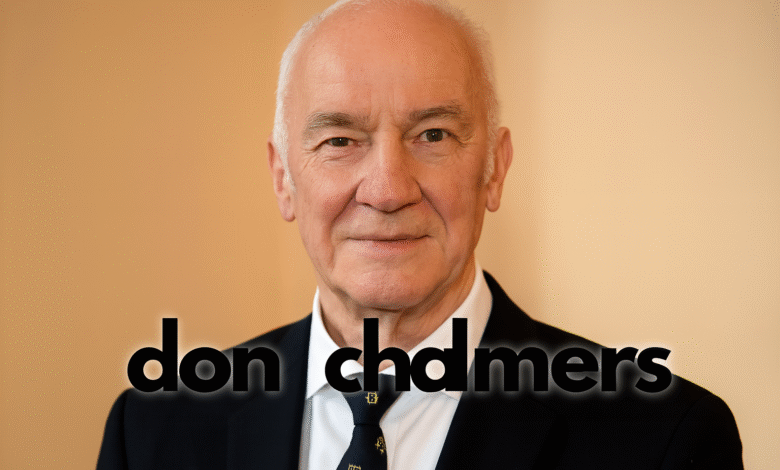Don Chalmers: A Visionary Leader in Law and Ethics – Celebrated Successes and Complex Challenges
Balancing Law, Ethics, and Genetics – The Inspiring Yet Challenging Journey of a Global Leader

Introduction
Don Chalmers is widely regarded as one of the most influential figures in the fields of law, medical research ethics, and genetics governance. His career has been defined by an extraordinary ability to balance innovation with ethical responsibility, guiding not only academic institutions but also national and international committees. While his journey is filled with groundbreaking achievements and recognition, it has also come with the weight of difficult responsibilities and the challenge of shaping policies in fast-moving areas like biotechnology and genomics.
This article provides a complete overview of Don Chalmers’ professional life, family background, career milestones, and legacy. It highlights both the positive influence he has made across the globe and the immense challenges that accompanied his leadership in law and ethics.
Quick Bio
| Attribute | Details |
|---|---|
| Full Name | Donald (Don) Chalmers |
| Profession | Emeritus Professor of Law, University of Tasmania |
| Specialization | Law, Medical Research Ethics, Human Genetics Governance |
| Career Highlights | Chair of multiple national ethics committees, International Cancer Genome Consortium, Centre for Law and Genetics |
| Family | Married to Barbara Avalon Baker (Governor of Tasmania), with two daughters and three grandsons |
| Legacy | Pioneer in law and genetics ethics, influential in shaping national and international guidelines |
Early Life and Academic Journey
Don Chalmers’ academic path began with a passion for law and governance, setting the foundation for a career dedicated to ensuring fairness, ethics, and accountability in research and public life. His strong background in law eventually positioned him to explore specialized areas such as medical research ethics and biotechnology regulation.
From his early days in academia, he demonstrated a commitment to shaping minds and institutions. This dedication later led him to the University of Tasmania, where he would spend decades as a teacher, mentor, and leader. His intellectual curiosity and leadership style earned him the respect of colleagues, students, and policymakers alike.
Career Beginnings in Law
Chalmers first gained recognition as a legal scholar who understood the broader social responsibilities attached to law. His early involvement in committees and reform projects helped build his reputation as an expert willing to address complex issues in governance.
His appointment as Law Reform Commissioner for Tasmania between 1991 and 1997 showcased his ability to lead legal reforms that considered both traditional values and modern requirements. These years laid the groundwork for his later leadership on national and international ethical boards.
Academic Leadership and the University of Tasmania
One of the defining phases of his career was his long association with the University of Tasmania. Rising to become Dean of the Faculty of Law and later Distinguished Emeritus Professor, he left a mark on academic leadership. He also directed the Centre for Law and Genetics, a pioneering research hub exploring the ethical, legal, and social challenges of genetics and biomedicine.
Through his academic career, Chalmers supervised postgraduate researchers, led innovative projects, and inspired policy debate. His leadership style balanced scholarly excellence with a practical sense of responsibility to the community, ensuring that academic contributions had real-world impact.
National Service and Governance Roles
Chairing National Ethics Committees
Chalmers was appointed Chair of the NHMRC Australian Health Ethics Committee from 1994 to 2000. In this role, he oversaw the development of the National Statement on Ethical Conduct in Research Involving Humans, a landmark policy that continues to guide researchers today.
His leadership extended to the NHMRC Embryo Research Licensing Committee (2002–2012) and the Gene Technology Ethics and Community Consultative Committee (2002–2012). These roles placed him at the center of debates about controversial scientific fields, requiring him to make tough decisions balancing scientific progress with moral boundaries.
Community Contributions
Beyond medical research, Chalmers chaired the Australian Red Cross Ethics Committee (2000–2010) and contributed to advisory bodies such as the Australian Institute of Family Studies and the National Breast and Ovarian Cancer Centre. His voice in these institutions strengthened ethical decision-making across sectors.
International Contributions
Chalmers’ influence was not limited to Australia. He became Chair of the Data Access Committee of the International Cancer Genome Consortium, guiding the use of genetic data with fairness and transparency. His participation in the Human Genome Organisation Ethics Committee and the Global Alliance for Genomic Health positioned him among the leading voices on global ethics in genetics.
Since 2004, he has served as a reviewer for Genome Canada, highlighting the trust placed in him by international scientific bodies. These global roles confirmed his status as a respected authority in law, ethics, and biomedicine.
Awards and Recognition
Chalmers’ contributions have been celebrated with some of Australia’s highest honors. He was named Officer of the Order of Australia (AO) in 2019 for distinguished service to law, education, and medical research ethics.
Earlier, he received the NHMRC Ethics Award, the University of Tasmania Distinguished Service Medal, and the Australian Red Cross Distinguished Service Award in 2010. His election as a Foundation Fellow of the Australian Academy of Law and as a Fellow of the Australian Academy of Health and Medical Sciences further cemented his standing in academic and professional circles.
Personal Life
Behind his professional success, Don Chalmers is also a family man. He is married to Barbara Avalon Baker, who currently serves as the Governor of Tasmania. Together, they have raised two daughters and now enjoy the company of three grandsons. His role as a supportive partner in public life and as a family leader adds another dimension to his story, balancing public duties with private commitments.
His close involvement in Government House activities alongside his wife illustrates his continued presence in Tasmania’s civic life, even after stepping down from his formal academic role.
Legacy and Lasting Impact
Don Chalmers’ legacy lies in his ability to guide legal and ethical frameworks during times of rapid scientific change. He was instrumental in embedding ethics into the foundations of medical and genetic research, ensuring that progress never outpaced responsibility.
His work influenced national and international governance, leaving a lasting imprint on policy, law, and community trust. As a mentor, professor, and leader, he shaped countless scholars and professionals who continue his mission of ethical vigilance. The challenges he faced in balancing opposing views—progress versus caution, science versus ethics—only highlight the magnitude of his responsibilities and his unwavering commitment to fairness.
Conclusion
Don Chalmers’ career is a story of vision, service, and resilience. From his leadership at the University of Tasmania to his role in national and international ethics committees, he has helped define the boundaries of responsible scientific progress. His journey demonstrates both the successes of a dedicated legal scholar and the heavy responsibilities of being at the center of ethical debates.
Today, his influence continues through the policies he shaped, the institutions he guided, and the scholars he mentored. Don Chalmers stands as a testament to how one individual’s work can bridge the gap between science, ethics, and law for the benefit of society.
Frequently Asked Questions (FAQ)
Q1: Who is Don Chalmers?
A1: Don Chalmers is an Emeritus Professor of Law at the University of Tasmania, known for his leadership in medical research ethics, genetics regulation, and international law committees.
Q2: What is Don Chalmers best known for?
A2: He is best known for shaping ethical frameworks in genetics, biobanking, and medical research, including contributing to the National Statement on Ethical Conduct in Human Research.
Q3: Who is Don Chalmers’ wife?
A3: He is married to Barbara Avalon Baker, the Governor of Tasmania. They have two daughters and three grandsons.
Q4: What awards has Don Chalmers received?
A4: His honors include Officer of the Order of Australia, the NHMRC Ethics Award, and the University of Tasmania Distinguished Service Medal.
Q5: What is Don Chalmers’ legacy?
A5: His legacy is his profound influence on law and ethics in Australia and internationally, ensuring that scientific and medical research is guided by fairness, accountability, and human responsibility.



